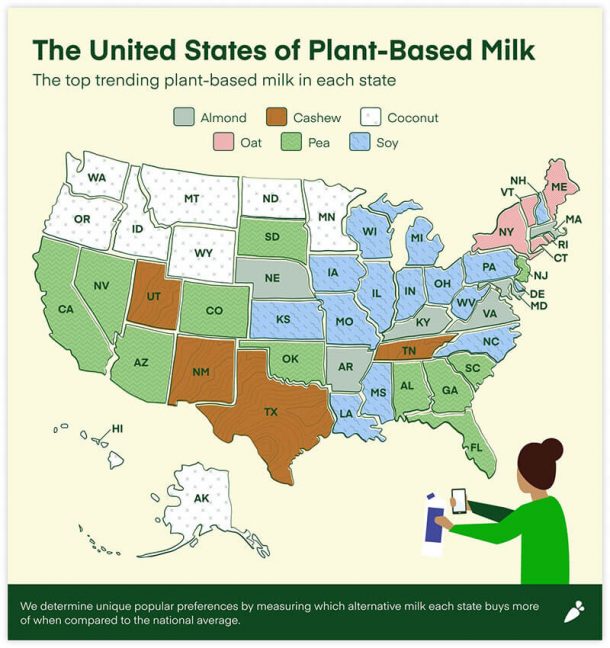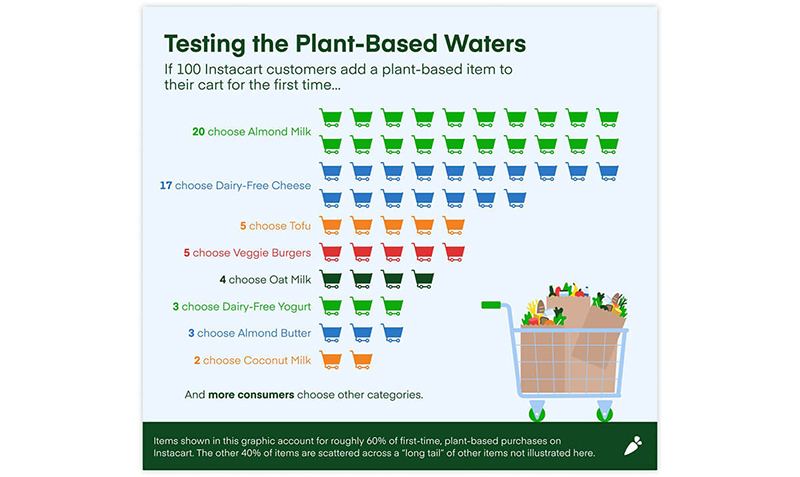Instacart has released its “Plant Power” report, a new data-driven examination of the mainstream consumer migration to plant-based alternatives. 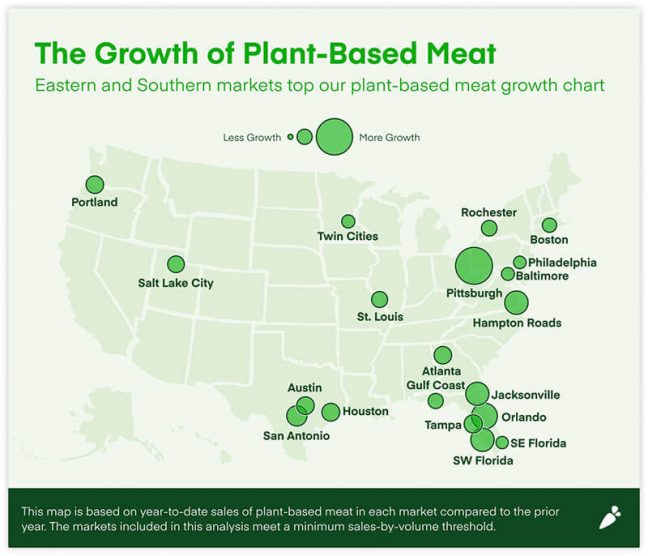
According to Instacart sales data, one in three Instacart customers has purchased a plant-based meat or milk product. Further, according to a recent Instacart survey conducted by The Harris Poll, when asked about the grocery and food habits adopted during the COVID-19 pandemic that they’ll keep for the long term, 30 percent of survey respondents said they plan to continue eating healthier by preparing lighter, plant-based meals.
“Plant-based food has grown from a niche category into a grocery staple over the past two years,” said Laurentia Romaniuk, Instacart’s trends expert and senior product manager. “Searches for terms like ‘plant -based,’ ‘meatless,’ vegetarian’ and especially ‘vegan’ took off on Instacart as consumers looked for healthy at-home meals during 2020 lockdowns. And this trend is turning into a long-term lifestyle – search popularity has been growing even more in 2021.”
In the report, Instacart analysts looked to search and purchase data to track the growing popularity of meat and milk alternatives, paint a portrait of plant-based customers, highlight trending plant-based brands, map milk alternative preferences across the country and highlight the next big plant-based product that vegans and meat eaters alike will be barbecuing this summer. The report explores five key themes:
Meat and Milk Alternatives Go Mainstream
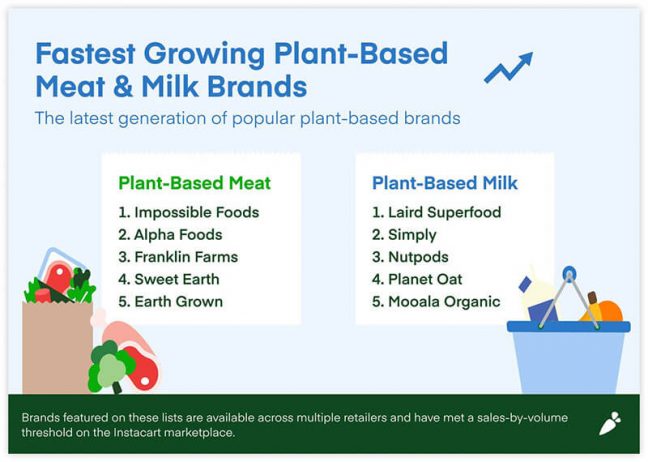 Over the last three years, two plant-based categories in particular captured the attention of Instacart customers: the grill-friendly “faux meat” category saw major sales growth on Instacart last year, with 42 percent YOY growth in 2020; and plant-based milk alternatives also experienced a noted jump, with adoption rates increasing by 27 percent throughout 2020.
Over the last three years, two plant-based categories in particular captured the attention of Instacart customers: the grill-friendly “faux meat” category saw major sales growth on Instacart last year, with 42 percent YOY growth in 2020; and plant-based milk alternatives also experienced a noted jump, with adoption rates increasing by 27 percent throughout 2020.
The fastest growing plant-based meat brands on the Instacart marketplace in 2021 include: 1) Impossible Foods; 2) Alpha Foods; 3) Franklin Farms; 4) Sweet Earth; and 5) Earth Grown.
The fastest growing plant-based milk and creamer alternatives on the Instacart marketplace in 2021 include: 1) Laird Superfood; 2) Simply; 3) Nutpods; 4) Planet Oat; and 5) Mooala Organic.
A Portrait of the Plant-Based Consumer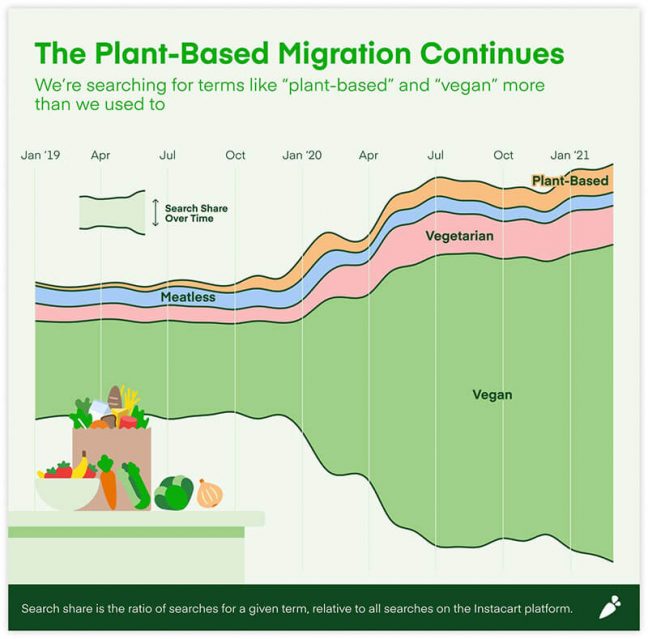
Anonymized purchase data reveals several key characteristics about plant-based customers on the Instacart marketplace:
- They tend to be younger, except when it comes to soy milk: Plant-based customers on Instacart tend to skew younger when compared to regular meat and milk buyers, with more than one in three between the ages of 30-39. In the dairy aisle, oat milk buyers tend to be younger than regular milk buyers, with a majority of them younger than 35 years old, while soy milk buyers tend to be older than conventional milk buyers.
- Many are meat eaters: Nearly half (43 percent) of Instacart customers who buy plant-based meat also buy conventional meat.
- Plant-based purchasing is growing fastest in the South and East: Consumers living in western metros like Portland, the San Francisco Bay Area, Los Angeles, and Seattle buy the most plant-based meat and milk products by volume. When we measure by growth of sales, southern metros like Southwestern Florida (+11 percent); Atlanta, Georgia (+8 percent); Orlando, Florida (+8 percent); Tampa, Florida (+8 percent); and Hampton Roads, Virginia (+7 percent) dominate 2021 milk alternative growth rankings. In the meat aisle, Pittsburgh, Pennsylvania (+55 percent); Orlando, Florida (+22 percent); Hampton Roads, Virginia (+20 percent); Jacksonville, Florida (+18 percent); and Atlanta, Georgia (+18 percent) are buying plant-based meat at the fastest clip in 2021.
What’s In My Cart: Kale or Cola?
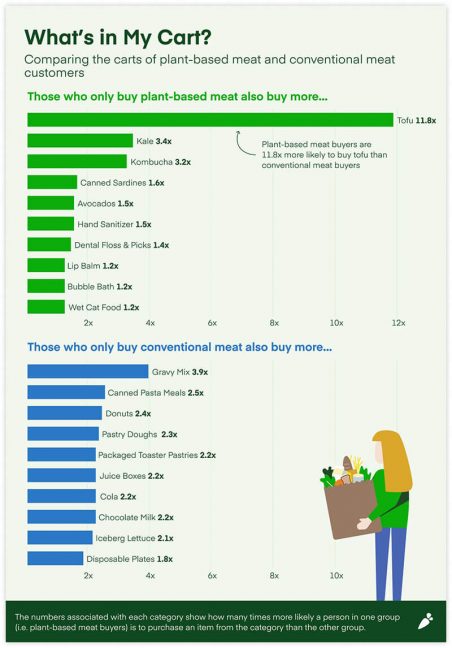 Instacart compared the carts of customers who buy only plant-based ground meat to those who buy only conventional ground meat to reveal what else is more likely to be in their carts:
Instacart compared the carts of customers who buy only plant-based ground meat to those who buy only conventional ground meat to reveal what else is more likely to be in their carts:
- Customers who buy only plant-based ground meat are more likely to buy: tofu (11.8x more likely), kale (3.4x), kombucha (3.2x), sardines (1.6x), avocados (1.5x), hand sanitizer (1.5x), dental floss (1.4x), lip balm (1.2x), bubble bath (1.2x) and wet cat food (1.2x).
• Customers who buy only conventional ground meat are more likely to buy: gravy mix (3.9x more likely), canned pasta (2.5x), donuts (2.4x), pastry dough (2.3x), toaster pastries (2.2x), juice boxes (2.2x), cola (2.2x), chocolate milk (2.2x), iceberg lettuce (2.1x) and disposable plates (1.8x).
Team Oat or Almond? The Plant-Based Milk War Is Raging
Almond milk easily dominates plant-based milk sales on the Instacart marketplace and is also the product that first-time plant-based customers reach for the most in the digital aisles:
If 100 Instacart customers add a plant-based item to their cart for the first time: 20 choose almond milk, 17 choose dairy-free cheese, five choose tofu, five choose veggie burgers, four choose oatmilk, three choose dairy-free yogurt, three choose almond butter and two choose coconut milk.
However, a growing list of other milk alternatives is starting to challenge almond milk’s lead in the plant-based milk war, depending on where you live: In the West and Southeast, consumers buy more pea milk than the national average, whereas coconut milk stands out in the Pacific Northwest and oat milk trends in the Northeast. In the Midwest, Mid-Atlantic and part of the South, consumers are buying more soy milk and almond milk than the national average.
Jackfruit: The Next Big Crossover?
Instacart data reveals that plant-based customers have also been eyeing another meat alternative – jackfruit. Instacart customers adopted jackfruit at a 50 percent faster clip in 2020, and the popular meat stand-in’s growth continues into 2021.
“We expect consumers will diversify their summer grills with more plant proteins this year,” said Romaniuk. “If jackfruit adoption rates continue to grow at the rate they did during the pandemic, a lot more consumers will be pairing pulled jackfruit with their vegan sausages and plant-based burgers this barbecue season.”
Methodology
This survey was conducted online within the United States by The Harris Poll on behalf of Instacart from Feb. 25-March 1, among 2,038 U.S. adults ages 18 and older. This online survey is not based on a probability sample and therefore no estimate of theoretical sampling error can be calculated. For complete survey methodology, including weighting variables and subgroup sample sizes, contact [email protected].
Instacart analyzed anonymized, aggregated search and purchase activity across its marketplace to understand what products and categories are trending. For year-over-year measurements, Instacart compared searches and sales from Jan. 1, 2019-Dec. 31, 2019 to activity from Jan. 1, 2020 to Dec. 31, 2020. For 2021 year-to-date measurements, Instacart measured search and sales activity between Jan. 1 and May 10. All year-over-year and indexed data is normalized to account for customer growth.
